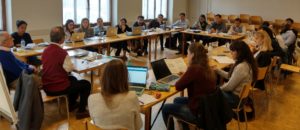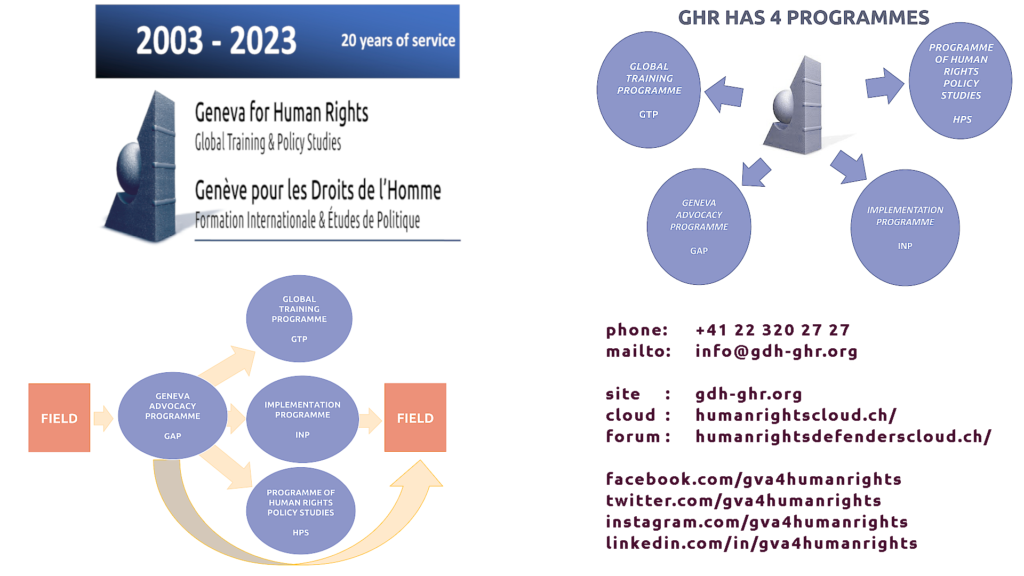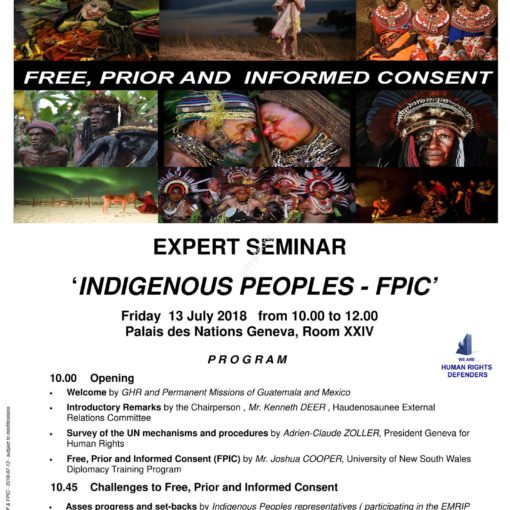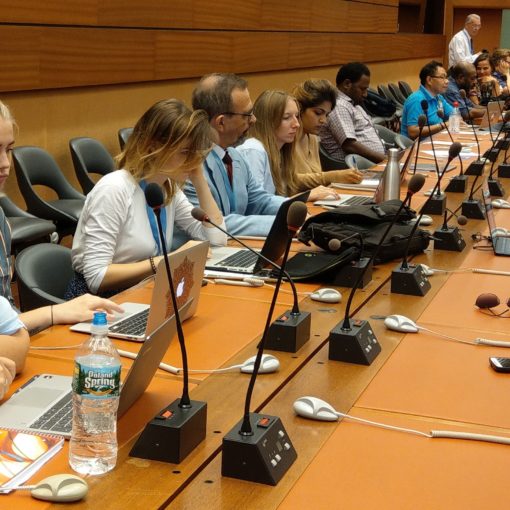On the occasion of the 55th session of the UN Human Rights Council – 55th Training Course for defenders from the regions
‘Course on the Human Rights Council, international human rights and humanitarian law, international procedures and diplomacy’
‘Hybrid’ Course, from 5 to 22 March 2024 – with additional on-line classes from 21 Feb to 11 Apr 2024
Geneva for Human Rights – Global Training & Policy Studies (gva4HR/GHR) conducts its 55th Geneva Course for defenders from the regions from Tuesday 5 to Friday 22 March 2024, that is during the 55th session of the UN Human Rights Council (26 February to 5 April 2024).
Traditionally, the Geneva Course is a three weeks course during the UN Human Rights Council session. The evaluation of recent Geneva Courses led gva4HR to add several training modules to these three weeks aiming at presenting in advance a general introduction to the UN human rights system, and at offering additional sessions on the conclusions of the Council’s session and on follow-up strategies.
Our trainings aim at inducing policy innovation and bringing transformative change. They serve political, economical and social policies and values which are people-centered, planet sensitive, life-protective, which are guided by values of human rights and social justice, which are enabled by democratic states and inclusive institutions, and are shaped through the participation of empowered populations and nations.
The training is hybrid and will be conducted in 8 weeks/modules. It starts on-line one week before the HR-Council and will resume it last training session on-line, one week after the HR-Council has ended.
| 8 Weeks | Dates | Themes | Participants coming to Geneva from the regions |
| Week 1 | 2 days – 21 & 22 Feb | Introduction to the UN human rights system | on-line |
| Week 2 | 1 day – 29 Feb | Monitoring and reporting on HR-Council: what is monitoring? | on-line |
| Week 3 | 5 days 5-6-7-8 Mar | Geneva Course 5 – 22 March General Course on HR-Council – UN human rights framework and system – Standards and Norms |
Those coming from
the regions to Geneva attend the Course in person and attend the sessions of the HR-Council |
| Week 4 | 5 days 11-12-13-14 Mar | Geneva Course (5 – 22 March) Specific courses on themes and countries (situations) |
|
| Week 5 | 5 days 18-19-20-21 Mar | Geneva Course (5 – 22 March) Course on the Council’s proceedings – Using the procedures |
|
| Week 6 | 2 days 25-26 Mar | Advocacy & Strategies: engage at local and national level | on-line |
| Week 7 | 2 days 3-4 Apr | Implementation : turn international norms into local reality | on-line |
| Week 8 | 2 days 10 & 11 Apr | Conclusions of the Council & follow-up strategies | on-line |
Geneva for Human Rights – gva4HR
gva4HR is an international training and policy studies organization aiming at contributing to the implementation and protection of human rights in the countries.
Since more than 20 years gva4HR supports and trains human rights NGOs, defenders and all those involved in human rights, at national and global level, to empower them in the use of domestic, regional and international procedures, and to realize implementation strategies at national level.
Leaving no one left behind and ‘all the rights for all’; inclusivity and respect for diversity; self-expression and self-identification; individual and collective sovereignty and self-determination; Free, Prior and Informed Consent: these are core values and driving forces leading our strategies and actions.
Already at the time of the Commission of Human Rights (1946-2006) and its Sub-Commission on the Promotion and Protection of Human Rights (1947-2006), gva4HR’s actual members and friends, since the 80’s, have been key if not crucial in contributing to the inception and creation of human rights mechanisms, bodies, decisions and initiatives as well as to the elaboration of universal standards and internationally recognised fundamental rights. As human rights are structurally prone to capture, instrumentalisation and distortion, they stood up to protect and serve them.
Since then, they have shared their knowledge, expertise and commitment in supporting victims, defenders and all those involved in the protection, promotion and implementation of human rights. gva4HR’s Circle of Trainers, created at the occasion of our 20 years of service and support, in 2023, contributes to bring specific and pertinent knowledge and expertise to our trainees and partners.
Since the creation of the UN Human Rights Council (‘HR-Council’) in 2006, gva4HR conducted its Geneva Course during most of the ordinary sessions of the HR-Council. In recent years, gva4HR also organized with its partners in the field and in the Regions, dozens of (3-4 days) in-Country Courses for defenders in Colombia, Guatemala, Honduras, Mexico, Russia, Botswana, Kenya, Bangladesh, Indonesia (Papua), Pakistan, Nepal, India, and Sri-Lanka.
gva4HR gives also Geneva briefings (especially for national NGOs coalitions) during sessions of the treaty bodies and of the Universal Periodic Review (UPR). It also convenes Experts Seminars on the main issues on the agenda of the HR-Council.
Our organisation’s pillars are training and research, advocacy and strategy, implementation and follow-up as well as HR policy studies and UN monitoring.
THE GENEVA COURSE (GSC)
The Geneva Course is an interactive and intensive training. It is designed to empower our trainees and to support them in the use of UN and international human rights procedures.
They combine the theory, the exchanges on the experience of the participants (field situations) and the exposure to the multilateral reality (the HR-Council), which the trainees monitor.
The courses have been adapted and updated to address the emergent debates, topics and challenges as well as future threats to human rights, the rule of law and democracy for instance IA and NET[i], neuro-technologies[ii], human rights and outer space[iii], civic space and democracy, sexual orientation and gender identity, self-determination, women’s and child’s rights, ecocide, …
Responsive to the legacy of, past and present, colonial and oppression systems and policies as well as accounting for the centuries of systemic racialised and gendered violations and discriminations, our courses and trainings focus on the challenges and opportunities of the international human rights system and of our times.
The courses of gva4HR do also address the new trends and reforms within the United Nations ecosystem and in international relations. New topics, new mechanisms and new tools emerge along with new dynamics at play. The rise of new matters of concerns affecting or impacting human rights in national, regional and international settings leads to new initiatives and changes in policies (the Common Agenda[iv] and Summit of the Future[v], reform/strengthening of HR-Council, Special Procedures, UN HR Treaty Bodies,…) these are a matter of concern and study for gva4HR.
The Geneva Course, along with all our activities, programmes and projects aims at bringing awareness and clarity on the opportunities and risks while decolonising the theory and pedagogical practices of human rights.
With the wide training experience and expertise of its trainers in Geneva and abroad, gva4HR’s Geneva Courses are unique. The Circle of Trainers is composed of academics, practitioners and defenders with a broad and diverse knowledge and understanding of the human rights system, its dynamics, forces and stakeholders.
Participants in the 55th Geneva Course
The Geneva Courses are part of a Programme of gva4HR promoting a full and effective participation of defenders from the regions in the work of the HR-Council. Such participation is essential for the quality of the Council’s debates.
Participants acquire basic knowledge in international human rights, humanitarian and criminal law; transitional justice; inter-governmental organisations (IGOs); the UN, its structure, its reforms and the role of its main organs; the trends in international relations; the functioning of the HR-Council and its mechanisms; the human rights standard setting process; and human rights treaty bodies.
Priority in the selection is given to defenders and NGOs from the regions. gva4HR also welcomes members of national and regional NGOs/CSOs coalitions working at the HR-Council in Geneva. We also open our courses to staff and members of human rights organisations having their seat or representation in Geneva, to young academics, interns and interested practitioners. Composed of its researchers and interns from different universities, gva4HR Programme of Human Rights Policy Studies (HPS) assists the trainees during UN human rights sessions.
As travels to Geneva are still difficult for defenders from certain countries because of visa restrictions, the Course will be conducted in a hybrid format, to allow those who cannot travel to attend. The programme and working methods will be adapted accordingly to enable trainees to benefit of a minimum of exposure to the ongoing debates.
Programme of the training course
The Geneva Course (5 to 22 March 2024) will therefore be completed by other classes during a period of eight weeks before, during and after the HR-Council session. The curriculum is divided in three parts covering eight weeks with one module each. The Geneva Course is enshrined in this cursus
The first module (Week-1) is devoted to the introduction to the UN Human Rights system and the HR-Council. Two days, prior to the start of the HRC-55th session participants receive information about what is at stake and under play at the forthcoming session. Trainees will be empowered with tools and information related to the HR-Council (Programme of Work, Annotated Agenda, Reports under review, mandates and elections, resolutions and decisions, …).
During the six weeks of the HR-Council, six modules will cover different and various facets of the HR regime. Week-2 will cover reporting and monitoring. Reporting on UN meetings and debates or on human rights violations, monitoring HR international decisions/national obligations or setting up an HR based approach or impact assessment methodology does not imply the same methods and techniques nor does it follows identical practice and procedure.
The Geneva Course starts at Week-3 which is devoted to the General Course on the international and UN human rights systems where participants will get a deeper and more precise knowledge on the UN human rights framework and system. The mechanisms of the HR-Council will be covered: Universal Periodic Review, Special Procedures, Expert mechanism, Forums,…) and also how to engage with HRC’s WG on UPR, UN HR Treaty Bodies and the UN HR procedures and mechanisms.
Since the building blocks of almost all human rights treaties are standards on specific rights and cross-cutting human rights norms, Week-4 will be made of specific courses on situations and themes which are transversal or critical within the UN and the international human rights regim.
A Course on the proceedings of the Council (Week-5), to discuss the debates and decisions in the HR-Council and to analyze the reports submitted by the Experts and the Office of the High Commissioner. During this sessions, the trainers will introduce the main thematic reports submitted to the 55th session of the HR-Council by OHCHR and the Special Rapporteurs (such as torture; human rights defenders; extreme poverty; adequate housing; …), as well as themes of High-level Panels.
Week-6 will be devoted to networks and coalitions building as well as on advocacy and strategy with, for those in Geneva, meetings with governmental and NGOs delegations in Geneva, exchanges, briefings and meetings with OHCHR’s staff and representatives and several visits will be proposed. One day of courses and one day of practical workshops will be conducted on-line.
Week-7 will cover strategy and advocacy with the aim to enable trainees to envision their future actions and activities as well as to elaborate national/local plans of action on implementation, protection or monitoring human rights.
The third section of the course, after the Council, (Week-8) focuses on the conclusion of the HR-Council (decisions and resolutions) and summaries of the debates in the HR-Council; on follow-up strategies and implementation in the countries (SDGs, national plans, technical assistance, NGOs strategies inside the countries) and finally the conclusions of the Course , the assessment and follow-up.
Course Administration
This 55th Geneva Course will be conducted in a hybrid manner. Each participant is encouraged to attend the Course and the HR-Council in person.
- The schedule of the daily classes (usually from 10:00 to 13:30 Geneva-time) makes it possible for on-line defenders from Europe, Africa and from Asia (afternoon there) to easily participate.
- The Course starts with an introduction module the week before the council.
- During the six weeks of the HR-Council the trainees will have morning sessions.
- The sessions end one week after the HR-Council (last day of the course 11.04.2024).
- To facilitate exchanges with and between the participants, the morning classes include short presentations of each theme, with space for questions and answers and for discussion. gva4HR will also enable trainees to intervene on-line and/or to send their questions in advance.
- Applicants are kindly invited to fill an application form outlining their activities, needs and priorities.
- Every afternoon, those present in Geneva will attend the session of the HR-Council; those on-line will follow several live and/or recorded UN sessions on ‘UN Web TV’.
- You can apply by sending a mail to info@gdh-ghr.org & hps-smt@gdh-ghr.org. Deadline for applications:
- for in-person participants: 19 February 202 (visa applications take time).
- for on-line participants: 19 February 2024.
- Tuition Fees for the Course is 1’200.00 Swiss francs (CHF). The fees include the full documentation and background papers as well as a personalized follow-up and implementation strategy briefing. The fees may be reduced on demand for human rights defenders from the regions having no sponsor.
| To obtain the Course’s certificate, trainees have to attend all the classes and to comply with several assignments: reading reports submitted to HR-Council, drafting a country paper and communication to UN thematic procedures, reporting on HR-Council debates, written evaluation/assessments for the participants. |
Genève pour les Droits Humains – Formation Internationale & Études de Politique
Geneva for Human Rights – Global Training & Policy Studies
[i] New emergent Technologies – https://www.ohchr.org/en/hr-bodies/hrc/advisory-committee/digital-technologiesand-hr
[ii] https://www.ohchr.org/en/hr-bodies/hrc/advisory-committee/neurotechnologies-and-human-rights
[iii] https://www.unoosa.org/oosa/en/ourwork/spacelaw/index.html
[iv] https://www.un.org/en/common-agenda
[v] https://www.un.org/en/summit-of-the-future






